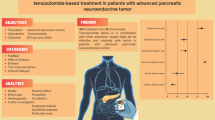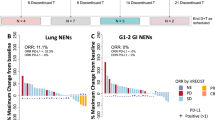Abstract
Purpose
Temozolomide (TEM) has been reported to be active alone or in combination with capecitabine (CAP) in patients with neuroendocrine neoplasms (NENs). We retrospectively evaluated activity and toxicity of TEM-based chemotherapy in patients with advanced NENs and explored the potential correlation with clinical/biological factors.
Methods
Patients received oral TEM alone or in combination with CAP. Objective response rate (ORR) [complete response + partial response (PR)], median progression-free survival (mPFS), and toxicity were calculated. The O6-methylguanine-DNA-methyltransferase (MGMT) gene inactivation status in tumor tissue was evaluated by pyrosequencing.
Results
From September 2008 to April 2020, 170 patients (84% progressive on different therapies) were consecutively treated, 114 (67%) patients received TEM-CAP and 56 (33%) TEM alone. Primary tumor sites were: pancreas 98 (58%), gastrointestinal tract 21 (12%), lung 35 (21%), and unknown 16 (9%). The ORR was 28% for the whole population (33% for TEM-CAP and 18% for TEM as single agent). The median OS (mOS) and mPFS of the whole population were 35.6 months (32.6–48.7) and 14.7 months (10.1–18.3), respectively. There were 48% PR in the MGMT hypermethylated, mainly in pancreatic NENs. Vomiting and leukopenia were the most frequent grade 3/4 toxicity.
Conclusions
This large retrospective analysis suggested that a TEM-based chemotherapy is active in advanced, pretreated NEN patients. It generated solid hypotheses that warrant a future prospective study in a biological homogeneous NEN population and clinical setting.

Similar content being viewed by others
References
H. Sorbye, S. Welin, S.W. Langer, L.W. Vestermark, N. Holt, P. Osterlund et al. Predictive and prognostic factors for treatment and survival in 305 patients with advanced gastrointestinal neuroendocrine carcinoma (WHO G3): the NORDIC NEC study. Ann. Oncol. 24(1), 152–160 (2013)
T. Walter, D. Tougeron, E. Baudin, K. Le Malicot, T. Lecomte, D. Malka et al. Poorly differentiated gastro-entero-pancreatic neuroendocrine carcinomas: are they really heterogeneous? Insights from the FFCD-GTE national cohort. Eur. J. Cancer 79, 158–65. (2017)
M. Heetfeld, C.N. Chougnet, I.H. Olsen, A. Rinke, I. Borbath, G. Crespo et al. Characteristics and treatment of patients with G3 gastroenteropancreatic neuroendocrine neoplasms. Endocr. Relat. Cancer 22(4), 657–664 (2015)
T. Yamaguchi, N. Machida, C. Morizane, A. Kasuga, H. Takahashi, K. Sudo et al. Multicenter retrospective analysis of systemic chemotherapy for advanced neuroendocrine carcinoma of the digestive system. Cancer Sci. 105(9), 1176–1181 (2014)
WHO Classification on Tumours Editorial Board. Digestive System Tumours. WHO Classification on Tumours (IARC, Lyon, 2019)
J. Crona, I. Fanola, D.P. Lindholm, P. Antonodimitrakis, K. Oberg, B. Eriksson et al. Effect of temozolomide in patients with metastatic bronchial carcinoids. Neuroendocrinology 98(2), 151–155 (2013)
S. Ekeblad, A. Sundin, E.T. Janson, S. Welin, D. Granberg, H. Kindmark et al. Temozolomide as monotherapy is effective in treatment of advanced malignant neuroendocrine tumors. Clin. Cancer Res. 13(10), 2986–2991 (2007)
C.R. Chong, L.J. Wirth, M. Nishino, A.B. Chen, L.M. Sholl, M.H. Kulke et al. Chemotherapy for locally advanced and metastatic pulmonary carcinoid tumors. Lung Cancer 86(2), 241–246 (2014)
J.R. Strosberg, R.L. Fine, J. Choi, A. Nasir, D. Coppola, D.T. Chen et al. First-line chemotherapy with capecitabine and temozolomide in patients with metastatic pancreatic endocrine carcinomas. Cancer 117(2), 268–275 (2011)
A. Koumarianou, S. Antoniou, G. Kanakis, N. Economopoulos, D. Rontogianni, A. Ntavatzikos et al. Combination treatment with metronomic temozolomide, bevacizumab and long-acting octreotide for malignant neuroendocrine tumours. Endocr. Relat. Cancer 19(1), L1–L4 (2012)
R.L. Fine, A.P. Gulati, B.A. Krantz, R.A. Moss, S. Schreibman, D.A. Tsushima et al. Capecitabine and temozolomide (CAPTEM) for metastatic, well-differentiated neuroendocrine cancers: The Pancreas Center at Columbia University experience. Cancer Chemother. Pharmacol. 71(3), 663–670 (2013)
M.W. Saif, K. Kaley, M. Brennan, M.C. Garcon, G. Rodriguez, T. Rodriguez, A retrospective study of capecitabine/temozolomide (CAPTEM) regimen in the treatment of metastatic pancreatic neuroendocrine tumors (pNETs) after failing previous therapy. J. Pancreas 14(5), 498–501 (2013)
R.D. Peixoto, K.L. Noonan, P. Pavlovich, H.F. Kennecke, H.J. Lim, Outcomes of patients treated with capecitabine and temozolamide for advanced pancreatic neuroendocrine tumors (PNETs) and non-PNETs. J. Gastrointest. Oncol. 5(4), 247–252 (2014)
S. Abbasi, A. Kashashna, H. Albaba, Efficacy of capecitabine and temozolomide combination in well-differentiated neuroendocrine tumors: Jordan experience. Pancreas 43(8), 1303–1305 (2014)
G. Crespo, P. Jimenez-Fonseca, A. Custodio, C. Lopez, A. Carmona-Bayonas, V. Alonso et al. Capecitabine and temozolomide in grade 1/2 neuroendocrine tumors: a Spanish multicenter experience. Future Oncol. 13(7), 615–624 (2017)
M. Cives, M. Ghayouri, B. Morse, M. Brelsford, M. Black, A. Rizzo et al. Analysis of potential response predictors to capecitabine/temozolomide in metastatic pancreatic neuroendocrine tumors. Endocr. Relat. Cancer 23(9), 759–767 (2016)
D.H. Owen, A.J. Alexander, B. Konda, L. Wei, J.A. Hemminger, C.R. Schmidt et al. Combination therapy with capecitabine and temozolomide in patients with low and high grade neuroendocrine tumors, with an exploratory analysis of O(6)-methylguanine DNA methyltransferase as a biomarker for response. Oncotarget 8(61), 104046–104056 (2017)
D. Campana, T. Walter, S. Pusceddu, F. Gelsomino, E. Graillot, N. Prinzi et al. Correlation between MGMT promoter methylation and response to temozolomide-based therapy in neuroendocrine neoplasms: an observational retrospective multicenter study. Endocrine 60(3), 490–498 (2018)
A. Chauhan, Z. Farooqui, L.A. Murray, H.L. Weiss, Z. War Myint, A.K.A. Raajasekar et al. Capecitabine and temozolomide in neuroendocrine tumor of unknown primary. J. Oncol. 2018, 3519247 (2018)
L. de Mestier, T. Walter, H. Brixi, C. Evrard, J.L. Legoux, P. de Boissieu et al. Comparison of temozolomide-capecitabine to 5-fluorouracile-dacarbazine in 247 patients with advanced digestive neuroendocrine tumors using propensity score analyses. Neuroendocrinology 108(4), 343–353 (2019)
E. Chatzellis, A. Angelousi, K. Daskalakis, M. Tsoli, K.I. Alexandraki, E. Wachula et al. Activity and safety of standard and prolonged capecitabine/temozolomide administration in patients with advanced neuroendocrine neoplasms. Neuroendocrinology 109(4), 333–345 (2019)
T. Al-Toubah, B. Morse, J. Strosberg, Strosberg. Capecitabine and temozolomide in advanced lung neuroendocrine neoplasms.Oncologist 25(1), e48–e52 (2019)
G. Papaxoinis, Z. Kordatou, L. McCallum, M. Nasralla, A. Lamarca, A. Backen, et al. Capecitabine and temozolomide in patients with advanced pulmonary carcinoid tumours. Neuroendocrinology 110(5), 413–421 (2019)
S. Welin, H. Sorbye, S. Sebjornsen, S. Knappskog, C. Busch, K. Oberg, Clinical effect of temozolomide-based chemotherapy in poorly differentiated endocrine carcinoma after progression on first-line chemotherapy. Cancer 117(20), 4617–4622 (2011)
J.A. Chan, K. Stuart, C.C. Earle, J.W. Clark, P. Bhargava, R. Miksad et al. Prospective study of bevacizumab plus temozolomide in patients with advanced neuroendocrine tumors. J Clin Oncol. 30(24), 2963–2968 (2012)
S. Tafuto, C. von Arx, M. Capozzi, F. Tatangelo, M. Mura, R. Modica, et al. Safety and activity of metronomic temozolomide in second-line treatment of advanced neuroendocrine neoplasms. J. Clin. Med. 8(8), 1224 (2019)
F. Spada, L. Antonuzzo, R. Marconcini, D. Radice, A. Antonuzzo, S. Ricci, et al. Oxaliplatin-based chemotherapy in advanced neuroendocrine tumors: clinical outcomes and preliminary correlation with biological factors. Neuroendocrinology 103, 806–814 (2016)
E. Bajetta, L. Catena, G. Procopio, S. De Dosso, E. Bichisao, L. Ferrari, et al. Are capecitabine and oxaliplatin (XELOX) suitable treatments for progressing low-grade and high-grade neuroendocrine tumours? Cancer Chemother. Pharmacol. 59, 637–642 (2007)
A. Berruti, N. Fazio, A. Ferrero, M.P. Brizzi, M. Volante, E. Nobili et al. Bevacizumab plus octreotide and metronomic capecitabine in patients with metastatic well-to-moderately differentiated neuroendocrine tumors: the XELBEVOCT study. BMC Cancer 14, 184 (2014)
T. Browder, C.E. Butterfield, B.M. Kraling, B. Shi, B. Marshall, M.S. O’Reilly et al. Antiangiogenic scheduling of chemotherapy improves efficacy against experimental drug-resistant cancer. Cancer Res. 60(7), 1878–1886 (2000)
R.A. Gatenby, A.S. Silva, R.J. Gillies, B.R. Frieden, Adaptive therapy. Cancer Res. 69(11), 4894–4903 (2009)
J. Murakami, Y.J. Lee, S. Kokeguchi, H. Tsujigiwa, J. Asaumi, H. Nagatsuka et al. Depletion of O6-methylguanine-DNA methyltransferase by O6-benzylguanine enhances 5-FU cytotoxicity in colon and oral cancer cell lines. Oncol. Rep. 17(6), 1461–1467 (2007)
J.R. Strosberg, A.B. Benson, L. Huynh, M.S. Duh, J. Goldman, V. Sahai et al. Clinical benefits of above-standard dose of octreotide LAR in patients with neuroendocrine tumors for control of carcinoid syndrome symptoms: a multicenter retrospective chart review study. Oncologist 19(9), 930–936 (2014)
National Institutes of Health. Common Terminology Criteria For Adverse Events (CTCAE) v.4.0 (DHHS, NCI, NIH, 2009)
M. Dowsett, T.O. Nielsen, R. A’Hern, J. Bartlett, R.C. Coombes, J. Cuzick et al. Assessment of Ki67 in breast cancer: recommendations from the International Ki67 in Breast Cancer Working Group. J. Natl Cancer Inst. 103(22), 1656–1664 (2011)
E.A. Eisenhauer, P. Therasse, J. Bogaerts, L.H. Schwartz, D. Sargent, R. Ford et al. New response evaluation criteria in solid tumours: revised RECIST guideline (version 1.1). Eur. J. Cancer 45(2), 228–247 (2009)
S.H. Yang, K.S. Lee, H.J. Yang, B.H. Jeon, Y.S. Lee, S.W. Nam et al. O(6)-methylguanine-DNA-methyltransferase promoter methylation assessment by microdissection-assisted methylation-specific PCR and high resolution melting analysis in patients with glioblastomas. J. Neurooncol. 106(2), 243–250 (2012)
V. Quillien, A. Lavenu, L. Karayan-Tapon, C. Carpentier, M. Labussiere, T. Lesimple et al. Comparative assessment of 5 methods (methylation-specific polymerase chain reaction, MethyLight, pyrosequencing, methylation-sensitive high-resolution melting, and immunohistochemistry) to analyze O6-methylguanine-DNA-methyltranferase in a series of 100 glioblastoma patients. Cancer 118(17), 4201–4211 (2012)
L. Karayan-Tapon, V. Quillien, J. Guilhot, M. Wager, G. Fromont, S. Saikali et al. Prognostic value of O6-methylguanine-DNA methyltransferase status in glioblastoma patients, assessed by five different methods. J. Neurooncol. 97(3), 311–322 (2010)
J.Y. Scoazec, A. Couvelard, [Classification of pancreatic neuroendocrine tumours: changes made in the 2017 WHO classification of tumours of endocrine organs and perspectives for the future]. Ann. Pathol. 37(6), 444–56. (2017)
A. Dasari, C. Shen, D. Halperin, B. Zhao, S. Zhou, Y. Xu et al. Trends in the incidence, prevalence, and survival outcomes in patients with neuroendocrine tumors in the United States. JAMA Oncol. 3(10), 1335–1342 (2017)
L. Rodriguez-Manas, C. Feart, G. Mann, J. Vina, S. Chatterji, W. Chodzko-Zajko et al. Searching for an operational definition of frailty: a Delphi method based consensus statement: the frailty operative definition-consensus conference project. J. Gerontol. Ser. A Biol. Sci. Med. Sci. 68(1), 62–67 (2013)
M. Pavel, D. O’Toole, F. Costa, J. Capdevila, D. Gross, R. Kianmanesh et al. ENETS Consensus Guidelines Update for the Management of Distant Metastatic Disease of Intestinal, Pancreatic, Bronchial Neuroendocrine Neoplasms (NEN) and NEN of Unknown Primary Site. Neuroendocrinology 103(2), 172–185 (2016)
W. Wick, M. Platten, C. Meisner, J. Felsberg, G. Tabatabai, M. Simon et al. Temozolomide chemotherapy alone versus radiotherapy alone for malignant astrocytoma in the elderly: the NOA-08 randomised, phase 3 trial. Lancet Oncol. 13(7), 707–715 (2012)
R.S. Kerbel, Inhibition of tumor angiogenesis as a strategy to circumvent acquired resistance to anti-cancer therapeutic agents. Bioessays. 13(1), 31–36 (1991)
M.H. Kulke, J.L. Hornick, C. Frauenhoffer, S. Hooshmand, D.P. Ryan, P.C. Enzinger et al. O6-methylguanine DNA methyltransferase deficiency and response to temozolomide-based therapy in patients with neuroendocrine tumors. Clin. Cancer Res. 15(1), 338–345 (2009)
Acknowledgements
The authors thank Dr. Linda Cairns for revising English.
Author information
Authors and Affiliations
Corresponding author
Ethics declarations
Conflict of interest
The authors declare that they have no conflict of interest.
Additional information
Publisher’s note Springer Nature remains neutral with regard to jurisdictional claims in published maps and institutional affiliations.
Rights and permissions
About this article
Cite this article
Spada, F., Maisonneuve, P., Fumagalli, C. et al. Temozolomide alone or in combination with capecitabine in patients with advanced neuroendocrine neoplasms: an Italian multicenter real-world analysis. Endocrine 72, 268–278 (2021). https://doi.org/10.1007/s12020-020-02421-2
Received:
Accepted:
Published:
Issue Date:
DOI: https://doi.org/10.1007/s12020-020-02421-2




